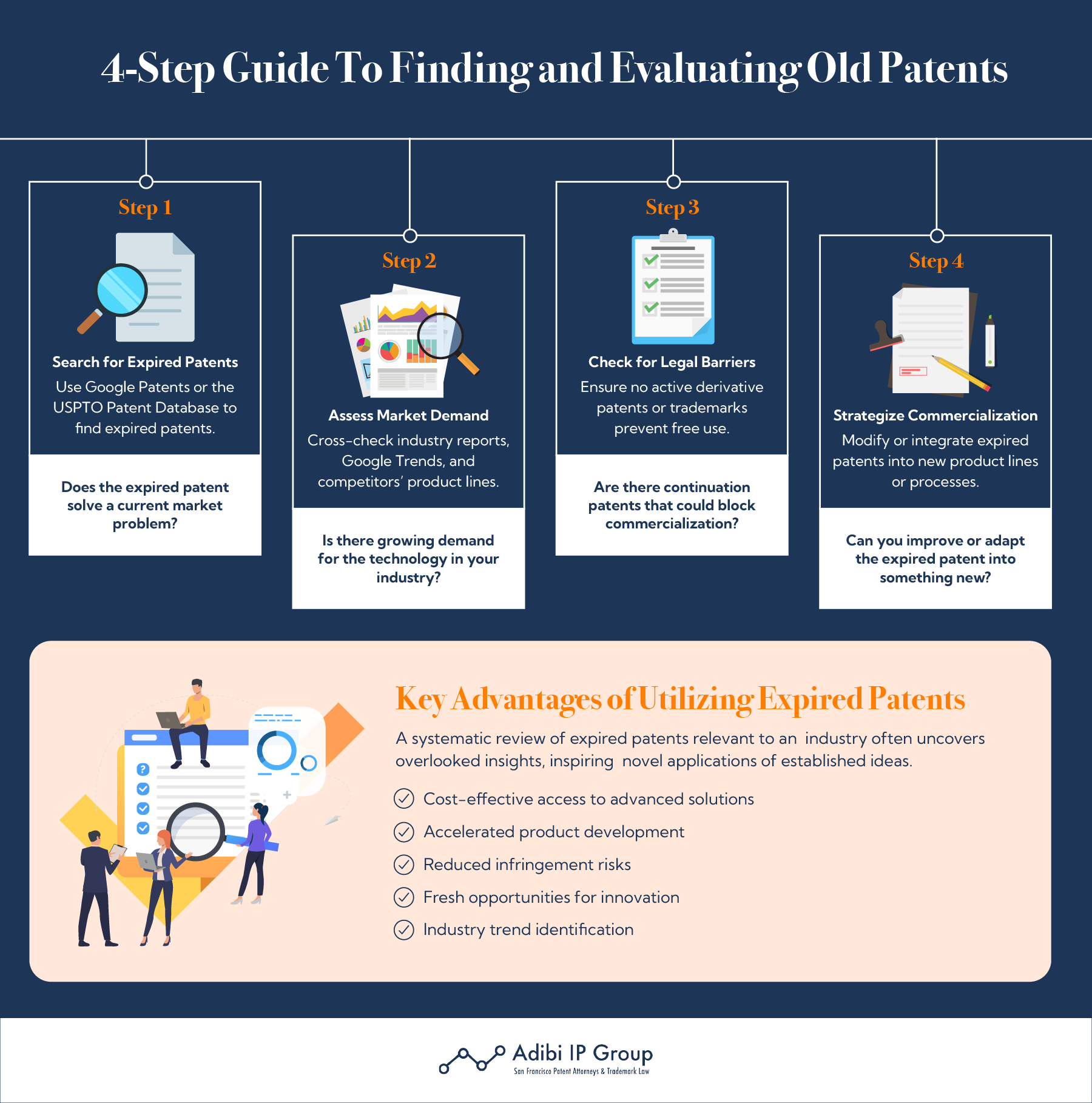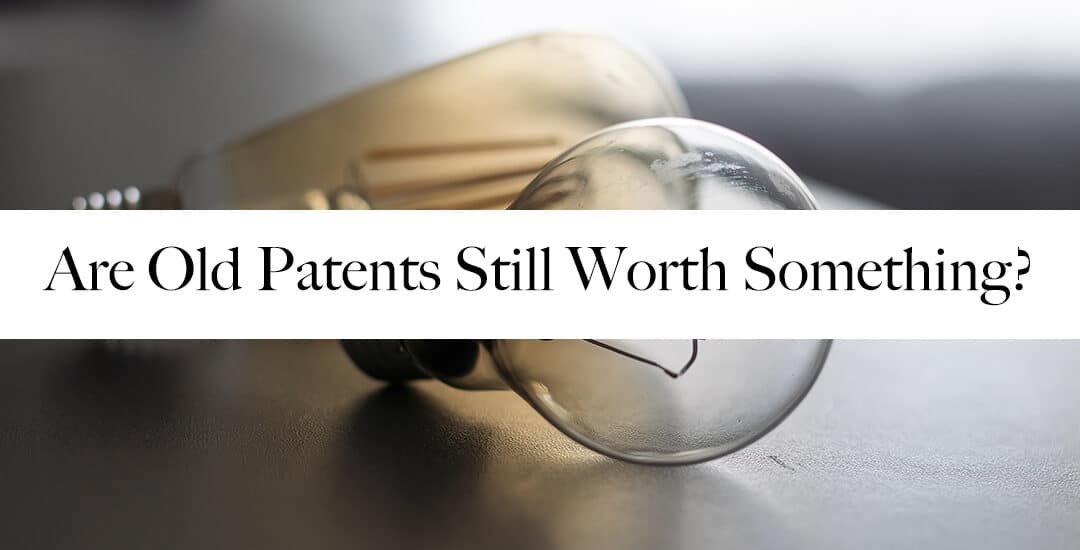Originally posted on July 1, 2023 @ 8:00 am
Each year, over 50,000 patents hit their expiration date in the United States alone, opening a treasure trove for smart entrepreneurs and R&D folks. Picture having instant access to top-notch technology and tried-and-true innovations without shelling out millions on research. But are old patents still worth anything? The answer might just knock your socks off.
Companies like Tesla, Sony, and Pfizer have turned expired U.S. patents into billion-dollar breakthroughs. Your next competitive edge might just lie in a forgotten patent waiting to be rediscovered.
Organizations that master the art of researching and leveraging expired patents gain a competitive edge by cutting R&D expenses and streamlining development. The detailed disclosures in these patents provide ready-made solutions, reducing the need to build from the ground up.
Key Takeaways
- Expired patents contain freely available technical knowledge and established solutions.
- Proper analysis of old patents can cut R&D expenses and speed up innovation.
- Companies can capitalize on expired patents by refining and repurposing established ideas.
The Lifespan of a Patent
Patent durations vary across countries, and certain patents may be eligible for extensions under specific circumstances. Therefore, it is necessary to consider the jurisdictions where a patent is granted. The lifespan of a patent generally depends on the type of patent:
| Type of Patent | What It Covers | How Long it Lasts |
| Utility Patents | Protect new processes, machines, compositions, or improvements thereof. | 20 years from the submission date. |
| Design Patents | Cover new, original, and ornamental designs. | 15 years from the date of the grant. |
| Plant Patents | Protect newly discovered or bred plant varieties. | 20 years from the submission date. |
In the U.S., patent holders must pay maintenance fees at 3.5, 7.5, and 11.5 years post-issuance to keep them active. Many organizations opt to abandon patents when costs outweigh perceived benefits. But even when patents expire, their value doesn’t necessarily disappear. So, are old patents still worth something? Let’s explore further.
What Happens When a Patent Expires?
Once a patent expires, the exclusive rights granted to the patent holder cease to exist. The patented technology becomes part of the public domain, allowing anyone to use, make, or sell it without infringing upon any rights. While this may reduce the direct value of the patent, other factors come into play when assessing the worth of old patents. Even after a patent expires, the knowledge and expertise gained from its development and commercialization can still hold value.
How Old Patents Maintain Relevance In Today’s Market
Expired U.S. patents provide a rich resource of technical insights, often serving as stepping stones for further innovation. Many pioneering advancements are built on concepts first disclosed in older patents now available to the public. Forward-thinking companies leverage these publicly available assets to drive innovation, optimize product development, and gain competitive advantages. But are old patents still worth something? Absolutely, if you know how to utilize them
Patent databases hold an extensive collection of intellectual capital that businesses can freely integrate into their operations, avoiding costly reinvention. By analyzing historical patents, businesses can access proven solutions, significantly reducing R&D costs and minimizing redundant efforts.
Are Old Patents a Hidden Treasure?
Expired patents remain a goldmine of technical knowledge and market insights. Old patents can possess inherent value even after their exclusivity expires. They embody the progress and innovation of the past, providing invaluable knowledge and inspiration for present and future inventors. Therefore, it is prudent to recognize the potential hidden treasures that lie within the vast sea of expired U.S. patents, preserving their legacy and enriching our collective intellectual capital.

The 3 Factors That Determine The Worth of Old Patents
Even after their protection period expires, old patents remain economically valuable through legal mechanisms and business strategies. There are several factors that affect this:
| Factors that Determine the Worth of an Old Patent | How They Affect the Worth |
| The relevance and potential use | Technological advancements and changing market demands can create new opportunities for inventions that were once deemed obsolete. |
| The availability of complementary technologies | Patents that fit well with existing innovations or can be combined to create new and marketable inventions may attract interest and potential buyers. |
| The availability and cost | If a patent can be acquired or licensed at a reasonable cost, entrepreneurs or companies may find it economically viable to invest in the patent and leverage its potential. |
If any of these factors apply to your patent, you may be able to sell it for a tidy profit. So, how can you monetize old patents? Let’s get into further detail.
The 4 Main Ways to Monetize Old Patents
There are multiple ways you could possibly monetize old patents, here are a few:
1) License your Patent
One effective way to monetize old patents is through licensing. By granting permission to others to use the patented technology, patent holders can generate licensing fees or royalties. This approach allows inventors to maintain ownership while still benefiting financially from their inventions.
Action Steps:
- Research Potential Licensees: Use the USPTO database to identify previous assignees or companies in related fields.
- Negotiate Terms: Establish clear agreements that account for the modifications and improvements made to the original technology.
- Monitor Industry Trends: Keep an eye on industries like biotech and consumer tech, where repurposed patents often find lucrative new applications.
2) Sell your Patent
Selling patents outright is another option for inventors who wish to cash in on their intellectual property. However, it is crucial to carefully consider this option as it involves relinquishing all rights to the invention.
Action Steps:
- Bundle Related Patents: Increase the appeal by packaging complementary patents together.
- List on Marketplaces: Use platforms like IPwe and FreePatentsOnline, or engage with private brokers to reach potential buyers.
- Prepare Detailed Documentation: Ensure that all technical and legal details are clearly documented to facilitate a smooth transaction.
3) Look for a Patent Troll
Some entities, commonly called patent trolls, specialize in buying old patents solely to initiate patent infringement lawsuits. While these practices have drawn criticism for their exploitative nature, they show that opportunistic individuals seeking legal compensation can leverage even expired U.S. patents.
Action Steps:
- Evaluate Risks: Carefully assess the legal and ethical implications before considering this avenue.
- Seek Legal Counsel: Consult with experienced IP attorneys to understand the potential risks and benefits.
4) Take Legal Action Against Infringements
Pursuing legal action can be a potential avenue for monetization for patent holders who believe their old patents are being infringed upon. If infringement is proven, patent holders may be entitled to significant compensation.
Action Steps:
- Document Infringements: Collect detailed evidence and compare it with the patent’s disclosures.
- Consult Legal Experts: Engage with patent attorneys to assess the strength of your case and the likelihood of success in litigation.
Real-World Applications and Examples
Delve into compelling case studies demonstrating real-world strategies that cut R&D costs, ignite market breakthroughs, and drive sustainable competitive advantage.
- 3D Printing Revolution: When key 3D printing patents expired in 2014, companies like Stratasys and MakerBot harnessed the resulting freedom to innovate. The expiration led to a surge of affordable consumer 3D printers, democratizing access to rapid prototyping and manufacturing.
- Tesla & Nikola Tesla’s Legacy: Tesla Inc. has famously built upon the pioneering work of Nikola Tesla. By leveraging concepts from expired patents, Tesla accelerated the development of its electric vehicles and power systems, setting new standards in sustainable transportation.
- Pharmaceutical Innovations: The expiration of blockbuster drugs like Pfizer’s Lipitor opened the market to generic manufacturers, demonstrating how expired U.S. patents can reshape entire industries. In the pharmaceutical sector, reformulating existing drugs or discovering new applications for an old compound has led to continued commercial success.
- Consumer Electronics: Sony’s foundational transistor patents, though expired, provided the technological groundwork for the company’s later dominance in consumer electronics. By continuously integrating and refining these early innovations, Sony maintained its competitive edge.
The 10 Factors that Determine the Value of a Patent
The worth of old patents extends beyond their immediate monetary value. They play a pivotal role in innovation and technological development. But what exactly is the role of old patents in fostering innovation? And how do technological advancements impact their worth? Here is a breakdown of the factors that make a patent more or less valuable:
| Factor that Determines the Value of a Patent | How It Affects the Value | How It Relates to Old Patents |
| Uniqueness and Usefulness | Highly innovative and commercially viable inventions have higher value, as they can generate profits and hold a competitive edge. | Even after expiration, patents with unique technical insights can remain valuable if they address ongoing industry needs. |
| Market Demand | If the invention solves a pressing problem or meets a future need, its value increases. | The strongest driver of an expired patent’s worth—if there’s demand for the technology, businesses can adopt it freely. |
| Breadth and Strength of Claims | Broad patents with well-defined claims that cover multiple aspects of an invention tend to have higher value. | Expired patents with broad foundational concepts (rather than niche applications) remain more useful for new adaptations. |
| Geographic Scope | A patent with international protection may hold more value than one limited to a specific region. | Less relevant for expired patents since global public-domain access eliminates the need for protection in multiple countries. |
| Potential for Licensing or Monetization | Patents that can be licensed or used in product development can generate significant revenue. | Direct licensing revenue is lost, but businesses can freely commercialize or integrate the expired technology into new products. |
| Duration of Protection | The longer a patent remains active, the longer it can generate revenue and market control. | If a patent was in force for a long time, it likely influenced industry standards, making its techniques valuable post-expiration. |
| The Reputation and Credibility of the Patent Holder | A well-known patent holder can enhance the perceived value of a patent, increasing trust and market appeal. | Can still impact adoption—companies may prefer well-documented, expert-backed expired patents over uncertain alternatives. |
| Level of Competition | A patent may be worth less due to market saturation if many similar inventions exist. | If competing innovations haven’t significantly surpassed the old patent, it may still hold value. (E.g., GPS, lithium-ion tech). |
| Economic Conditions and Trends | Patent value increases when industries seek new solutions or shift to emerging technologies. | If industry trends revive demand for older technologies (e.g., sustainability, AI), expired patents can be a hidden goldmine. |
| Potential for Future Improvements | If an invention has room for further development, it may attract greater long-term interest. | Expired patents with modular, improvable foundations (e.g., semiconductor designs and chemical formulations) retain long-term value. |
For active patents, exclusivity is a major driver of value. Once a patent expires, its direct market control disappears. However, expired patents retain strategic value if they fill a market gap, integrate with new technologies, or enable cost-effective innovation. Patent expiration isn’t the end—it’s a shift from exclusive asset to public-domain innovation fuel. Market demand and technological relevance are the biggest indicators of expired patent value.
Role Of Patent Attorneys In Maximizing Value
Patent attorneys provide essential expertise in determining the viability of old patents. Our knowledge helps businesses assess whether expired patents can be repurposed or if still-active patents hold untapped value. We help identify licensing prospects, infringement risks, and monetization strategies within patent portfolios.
Key Contributions Include:
- Comprehensive Patent Research: Attorneys help you identify valuable expired patents by navigating extensive databases and leveraging tools.
- Evaluating Claims and Scope: Experts assess the strength of a patent’s claims, advising whether it can be repurposed or integrated with current technologies.
- Identifying Licensing Opportunities: By connecting with industry players and negotiating agreements, patent attorneys can secure revenue-generating deals based on expired patents.
- Risk Management: They evaluate potential legal pitfalls, such as derivative patents or trademark conflicts, ensuring your strategies comply with current laws.
- Strategic Portfolio Structuring: Attorneys assist in crafting a roadmap that integrates expired patents into your overall innovation and market strategy, boosting competitive advantage.
What You Can Do Now:
- Explore Patent Databases: Start with platforms like Google Patents, the USPTO Patent Database, and The Lens.
- Identify Opportunities: Analyze expired patents in your industry for potential cost-saving and innovative solutions.
- Utilize Patent Law Experts: Experts like Adibi IP Group help you make the most of your situation with up-to-date knowledge and experience.
So, Are Old Patents Still Worth Something?
For active patents, exclusivity is a major driver of value. Once a patent expires, its direct market control disappears. However, expired U.S. patents retain strategic value if they fill a market gap, integrate with new technologies, or enable cost-effective innovation. Patent expiration isn’t the end—it’s a shift from exclusive asset to public-domain innovation fuel. If you’re looking to monetize old patents, consider their market demand, adaptability, and industry relevance.
Take the Next Step with Adibi IP Group:
At Adibi IP Group, we specialize in turning intellectual property into strategic advantages. Our experienced team helps businesses evaluate and monetize patent portfolios, ensuring you harness every opportunity available—even in expired patents.
Contact us today to schedule a consultation and discover how we can help you unlock hidden innovation, reduce R&D costs, and accelerate your competitive edge.






